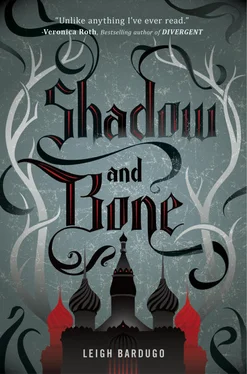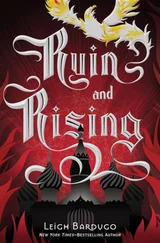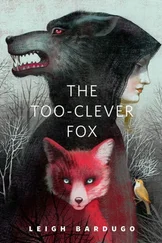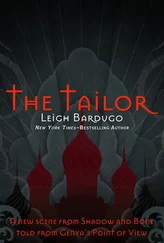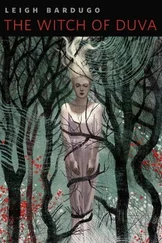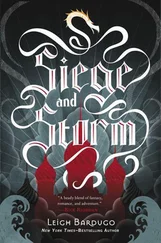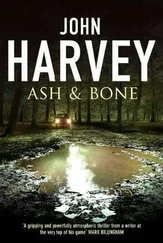I shuddered and paced, flinching at every sound.
By late afternoon, I was convinced that Mal had been identified and captured. When I heard footsteps and saw his familiar form emerge through the trees, I nearly sobbed with relief.
“Any trouble?” I asked shakily, trying to hide my nerves.
“None,” he said. “I’ve never seen a city so crowded with people. No one even gave me a second glance.”
He wore a new shirt and an ill-fitting coat, and his arms were laden with clothes for me: a sacklike dress in a red so faded it looked almost orange and a nubbly mustard-colored coat. He handed them to me and then tactfully turned his back so that I could change.
I fumbled with the tiny black buttons of the kefta. There seemed to be a thousand of them. When the silk finally slid over my shoulders and pooled at my feet, I felt a great burden lift from me. The cool spring air pricked my bare skin and, for the first time, I dared to hope that we might really be free. I quashed that thought. Until I knew the Darkling was dead, I would never draw an easy breath.
I pulled on the rough wool dress and the yellow coat.
“Did you deliberately buy the ugliest clothes you could find?”
Mal turned to look at me and couldn’t restrain a smile. “I bought the first clothes I could find,” he said. Then his grin faded. He touched my cheek lightly, and when he spoke again, his voice was low and raw. “I never want to see you in black again.”
I held his gaze. “Never,” I whispered.
He reached into his coat pocket and pulled out a long red scarf. Gently, he wrapped it around my neck, hiding Morozova’s collar. “There,” he said, smiling again. “Perfect.”
“What am I going to do when summer comes?” I laughed.
“By then we’ll have found a way to get rid of it.”
“No!” I said sharply, surprised by how much the idea upset me. Mal recoiled, taken aback. “We can’t get rid of it,” I explained. “It’s Ravka’s only chance to be free of the Shadow Fold.”
It was the truth—just not all of it. We did need the collar. It was insurance against the Darkling’s strength and a promise that someday we’d return to Ravka and find a way to set things right. But what I couldn’t tell Mal was that the collar belonged to me, that the stag’s power felt like a part of me now, and I wasn’t sure I wanted to let it go.
Mal studied me, his brow furrowed. I thought of the Darkling’s warnings, of the bleak look I’d seen in his face and in Baghra’s.
“Alina…”
I tried for a reassuring smile. “We’ll get rid of it,” I promised. “As soon as we can.”
Seconds passed. “All right,” he said at last, but his expression was still wary. Then, he pushed the crumpled kefta with the toe of his boot. “What should we do with this?”
I looked down at the heap of tattered silk and felt anger and shame roll over me.
“Burn it,” I said. And we did.
As the flames consumed the silk, Mal slowly pulled the rest of the golden pins from my curls, one by one, until my hair tumbled around my shoulders. Gently, he pushed my hair aside and kissed my neck, right above the collar. When the tears came, he pulled me close and held me, until there was nothing left but ashes.
THE BOY AND THE GIRL stand at the railing of the ship, a true ship that rolls and rocks on the heaving back of the True Sea.
“Goed morgen, fentomen! ” a deckhand shouts to them as he passes by, his arms full of rope.
All the ship’s crew call them fentomen . It is the Kerch word for ghosts.
When the girl asks the quartermaster why, he laughs and says it’s because they are so pale and because of the way they stand silent at the ship’s railing, staring at the sea for hours, as if they’ve never seen water before. She smiles and does not tell him the truth: that they must keep their eyes on the horizon. They are watching for a ship with black sails.
Baghra’s Verloren was long gone, so they had hidden in the slums of Os Kervo until the boy could use the gold pins from her hair to book passage on another ship. The city buzzed with the horror of what had happened in Novokribirsk. Some blamed the Darkling. Others blamed the Shu Han or Fjerdans. A few even claimed it was the righteous work of angry Saints.
Rumors began to reach them of strange happenings in Ravka. They heard that the Apparat had disappeared, that foreign troops were massing on the borders, that the First and Second Armies were threatening to go to war with each other, that the Sun Summoner was dead. They waited to hear word of the Darkling’s death on the Fold, but it never came.
At night, the boy and the girl lie curled around each other in the belly of the ship. He holds her tight when she wakes from another nightmare, her teeth chattering, her ears ringing with the terrified screams of the men and women she left behind on the broken skiff, her limbs trembling with remembered power.
“It’s all right,” he whispers in the darkness. “It’s all right.”
She wants to believe him, but she’s afraid to close her eyes.
The wind creaks in the sails. The ship sighs around them. They are alone again, as they were when they were young, hiding from the older children, from Ana Kuya’s temper, from the things that seemed to move and slither in the dark.
They are orphans again, with no true home but each other and whatever life they can make together on the other side of the sea.
Thanks to my agent and champion, Joanna Stampfel-Volpe. I feel lucky every day to have her on my side, as well as the wonderful team at Nancy Coffey Literary: Nancy, Sara Kendall, Kathleen Ortiz, Jaqueline Murphy, and Pouya Shahbazian.
My sharp-eyed and intuitive editor, Noa Wheeler, believed in this story and knew exactly how to make it better. Many thanks to the remarkable people at Holt Children’s and Macmillan: Laura Godwin, Jean Feiwel, Rich Deas and April Ward in design, and Karen Frangipane, Kathryn Bhirud, and Lizzy Mason in marketing and publicity. I’d also like to thank Dan Farley and Joy Dallanegra-Sanger. Shadow and Bone could not have found a better home.
My generous readers, Michelle Chihara and Josh Kamensky, lent me their supergenius brains and cheered me on with relentless enthusiasm and patience. Thanks also to my brother Shem for his art and long-distance hugs, Miriam “Sis” Pastan, Heather Joy Kamensky, Peter Bibring, Tracey Taylor, the Apocalypsies (especially Lynne Kelly, Gretchen McNeil, and Sarah J. Maas, who gave me my first review), my fellow WOART Leslie Blanco, and Dan Moulder, who was lost to the river.
I blame Gamynne Guillote for fostering my megalomania and encouraging my love of villains, Josh Minuto for introducing me to epic fantasy and making me believe in heroes, and Rachel Tejada for way too many late-night movies. Hedwig Aerts, my fellow pirate queen, put up with long hours of late-night typing. Erdene Ukhaasai diligently translated Russian and Mongolian for me over Facebook. Morgan Fahey kept me in cocktails, conversation, and delicious fiction. Dan Braun and Michael Pessah kept the beat.
Many books helped to inspire Ravka and bring it to life, including Natasha’s Dance: A Cultural History of Russia, by Orlando Figes; Land of the Firebird: The Beauty of Old Russia, by Suzanne Massie; and Russian Folk Belief, by Linda J. Ivanits.
And finally, many thanks to my family: my mother, Judy, whose faith never wavered, and who was first in line to order her kefta ; my father, Harve, who was my rock, and whom I miss every day; and my grandfather Mel Seder, who taught me to love poetry, seek adventure, and throw a punch.
Читать дальше
